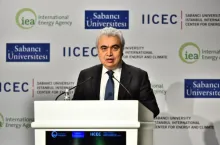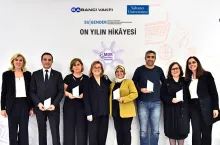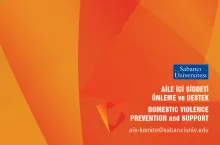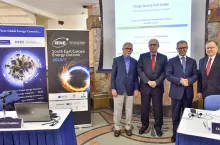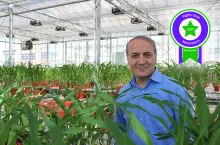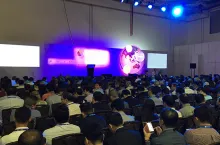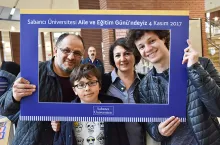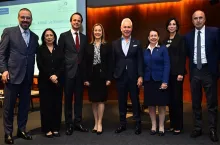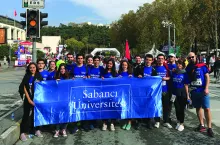Over 10 years, the Purple Certificate Program reached almost 3500 teachers in 17 provinces
Implemented by the Sabancı University Gender and Women Studies Center of Excellence (SU Gender) with support by the Sabancı Foundation since 2007, the Purple Certificate Program celebrates its 10th year.
Sabancı University Founding Board of Directors Chair and Sabancı Foundation Board of Directors Chair Güler Sabancı:
- Gender equality has always been a priority for us.
- The matter is important to all our institutions, and we take an integrated attitude towards it.
- In 2011, Sabancı Holding was the first Turkish company to sign the UN Women's Empowerment Principles.
- We started the Purple Certificate Program on gender equality with the Sabancı Foundation in 2007.
- Gender equality is a prerequisite for social justice. This can only be achieved through education.
- Over 10 years, the Purple Certificate Program reached almost 3500 teachers.

Implemented by the Sabancı University Gender and Women Studies Center of Excellence (SU Gender) with support by the Sabancı Foundation, the Purple Certificate Program celebrated its 10th year on Thursday, November 30, 2017 at the Sabancı Center with a ceremony attended by Purple Certificate holders. The book “10 Yılın Hikayesi [Story of a Decade]” prepared to commemorate the 10th year of the initiative was revealed, and a short documentary was screened. The Purple Certificate Program to promote awareness of gender equality across various levels of education reached out to almost 3500 teachers in 17 provinces since 2007.
Sabancı University Founding Board of Trustees Chair and Sabancı Foundation Board of Trustees Chair Güler Sabancı opened the 10th year celebration event of the Purple Certificate Program with an introductory speech, saying:

“We are delighted that our gender equality program has made a remarkable achievement over the years. Gender equality has always been a priority for us. The matter is important to all our institutions, and we take an integrated attitude towards it. In 2011, Sabancı Holding was the first Turkish company to sign the UN Women's Empowerment Principles. We established the Gender and Women's Studies Center of Excellence at Sabancı University. We lead trend-setting research under this institution. But our work in gender equality goes back even further. For example, we implemented the UN Human Rights of Girls and Woman-Friendly Cities programs with the Sabancı Foundation in 2006. We started the Purple Certificate Program on gender equality, which is the reason why we are here today, with the Sabancı Foundation in 2007."
SOCIAL CHANGE AND DEVELOPMENT ARE ONLY POSSIBLE THROUGH COLLABORATION AND A LONG-TERM APPROACH
Saying that gender equality was a prerequisite for social justice, Güler Sabancı continued:
"This can only be achieved through education. This is where our teachers have a generational duty to enable change and development in the society. The Purple Certificate Program is the result of the recognition of this fact. Over 10 years, the Purple Certificate Program reached almost 3500 teachers. It has a sustained effect thanks to their sharing and disseminating knowledge. I should remind everyone that social change and development are only possible through collaboration and a long-term approach. This is called the Triangle of Success. In one corner are NGOs, foundations and universities; in the other corner are the public authorities, ministries and other institutions; and in the third corner are businesses, workers and taxpayers. When the equation is right, the result is a success like the Purple Certificate Program. I hope that the program will extend years into the future, reaching more and more teachers. “
WE WILL CONTINUE TO DEMAND GENDER EQUALITY

Sabancı University President Ayşe Kadıoğlu said that the Purple Certificate Program has had a snowball effect since 2007. Kadıoğlu explained that the Program continued to expand its training activities and development of training materials with the intent of utilizing them in new projects. Saying that women demanded equality and not protection or guarding, Kadıoğlu stated that they would continue to demand gender equality, and carry out events to generate awareness on the subject. Kadıoğlu continued:
“Us faculty members came together in 2007 to start the Purple Certificate Program. In the initial meetings, we began to hear and understand each other. The synergy that resulted from such gatherings led to the foundation of the Gender and Women's Studies Center of Excellence, or SU Gender. The Center started its activities as a Forum in 2010. A wide range of activities slowly led to the Forum evolving into the Center. One of our first steps towards an ambitious objective was the establishment of the first English-language PhD program on gender in Turkey."
THE PURPLE CERTIFICATE JOURNEY CONTINUES TO GROW AND EXPAND

Telling the 10-year journey of the Purple Certificate Program, SU Gender Director Ayşe Gül Altınay said that the process involved teachers and students across all levels of education, reaching out to more than three thousand teachers in 17 provinces of Turkey over 10 years. Altınay continued:
“For 10 years, the Purple Certificate Program has been a nurturing, transforming space. One of the most exciting fruits of this space is SU Gender, or the Sabancı University Gender and Women's Studies Center of Excellence.
SU Gender arose out of the continued collaboration of faculty, students and employees who gathered around the Purple Certificate idea in 2006 and 2007, and grew to implement three different programs, perform research in various fields, and conduct awareness and education initiatives. The awareness we generated through the Purple Certificate Program helped teachers and students realize that gender was not an obstacle, and that gender equality could be experienced as a sphere of freedom, action, and solidarity. Born on the Sabancı University campus in Tuzla, Purple Certificate now travels to Izmir and Ankara. We started out by saying that another world was possible, and 10 years later, we stand stronger, deeper and more populous together. “
OUR JOURNEY TO CREATE GENDER AWARENESS BEGAN IN 2007

Purple Certificate Program Coordinator Ayşegül Taşıtman said that the program began with the support of the Sabancı Foundation in 2007 to educate high school teachers across Turkey in gender awareness. Taşıtman continued:
“The Purple Certificate Program began as a two-day training session at Sabancı University in 2007, and grew and evolved according to the needs we discovered, experiences we gained, and recommendations we received from teachers. In 10 years, we started the Purple Dossier and Purple Certificate Juniors programs. Another was the "Gender Certificate Program for Nongovernmental Organizations" that SU Gender undertook. We brough together NGOs from all over Turkey –particularly the Purple Certificate cities– which worked in education, people with disabilities, and refugees. In 10 years, the many components of the Purple Certificate Program made remarkable achievements. The program grew by including more teachers, teachers in training, and university students to undertake a leading role for all education actors and policymakers in ensuring gender equality in education."


